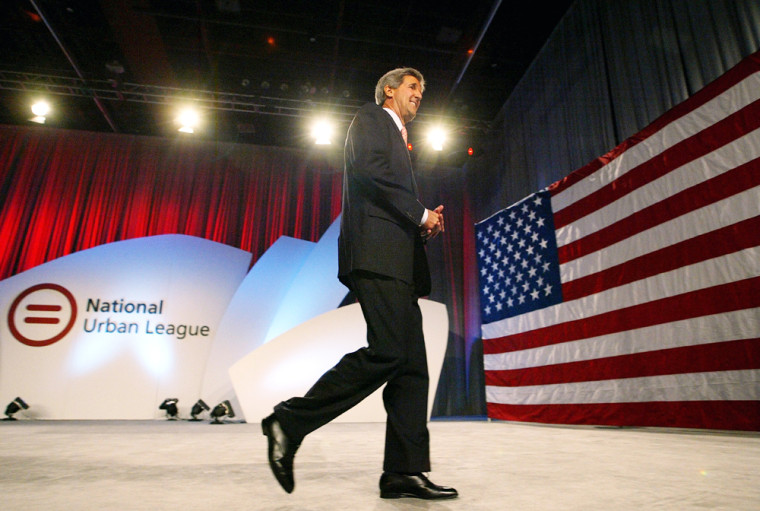Exactly one week before Sen. John Kerry, D-Mass., is to formally accept his party's presidential nomination, and just over 100 days until Election Day, President Bush and Kerry are locked in a statistical tie, the latest NBC/Wall Street Journal poll shows. The race is tied even though Kerry has received mostly positive media coverage since selecting Sen. John Edwards, D-N.C., as his running mate, while the Bush White House has seen less-than-positive news on key fronts.
The poll shows that Iraq and the economy continue to dog the president, and that Kerry seems to have a significant advantage with independent voters.
"In a period that should be very good for the Democrats with the Edwards announcement, the president has more than held his own," said Democratic pollster Peter D. Hart, of NBC/Journal polling team Hart/Teeter. "Having said that, it still remains a contest which is exceptionally difficult for Bush. ... He continues to have an uphill walk."
According to the poll, the Bush-Cheney ticket gets the support from 47 percent of registered voters, Kerry-Edwards gets 45 percent, and independent candidate Ralph Nader and his running mate Peter Camejo get 2 percent. In the last NBC/Wall Street Journal poll, which was released on June 30, Bush was at 45 percent, Kerry was at 44 percent, and Nader was at 4 percent.
Kerry, however, seems to have an advantage among independent voters: 45 percent of them side with the Massachusetts senator, compared with 33 percent who pick Bush, and 7 percent who side with Nader. At the same time, a sizable number of respondents — 34 percent — say they know only some or little about Kerry, although that number is down from 43 percent in the June survey.
58 percent believe economy faces trouble
In addition, despite the fact that the economy has added approximately 1.5 million jobs in the past 10 months, the poll finds that 58 percent of respondents believe the future of the economy is in trouble, while just 31 percent think it will be strong.
On the issue of Iraq, 47 percent say that removing Saddam Hussein from power wasn't worth the number of U.S. casualties and the financial cost of the war, while 43 percent say it was worth it. Those numbers are an improvement for Bush since the June poll, which showed that 51 percent didn't think it was worth it, versus 40 percent who did.
Regarding the intelligence on Iraq that Bush received and used to make his case for going to war, 56 percent of respondents say that Bush could have done more to make sure the intelligence he received was accurate, compared with 40 percent who say he did all he could.
When it comes to how the two parties stack up on the major issues, the poll finds that the Democratic Party has an eight-point advantage (40 to 32 percent) over the Republican Party in dealing with the economy. Meanwhile, the GOP also has an eight-point advantage (39 percent to 31 percent) over the Democrats in dealing with Iraq. However, that's a significant drop from the 27-point advantage the GOP held on Iraq back in January.
This latest poll — which was taken from July 19 to July 21 of 813 registered voters, and which has a margin of error of plus or minus 3.4 percentage points — comes after a month of both positive and negative news for Bush and Kerry. On July 2, the Labor Department reported that the economy grew by a modest 112,000 payroll jobs in June, about less than half the number economists were expecting. On July 9, the Senate Select Committee on Intelligence released its report, which refuted two of the Bush administration's chief rationales for war in Iraq: that Iraq possessed weapons of mass destruction and that Iraq cooperated with Al Qaeda. The report, however, laid the blame on the intelligence community, not the White House.
The Edwards bounce
Meanwhile, Kerry chose Edwards, the North Carolina senator, to be his running mate on July 6, an event that allowed Kerry to dominate the news for several days and produced a small bounce for him in many polls. Yet the Kerry-Edwards ticket received a flurry of criticism after prominent Hollywood entertainers and musicians, led by Whoopi Goldberg, made lewd and disparaging comments about Bush at a New York fund-raiser. Republicans pounced on Kerry's statement at the fund-raiser that these entertainers represented the "heart and soul" of America; Kerry's campaign manager later said that he and Edwards did not approve of some of the entertainers' comments.
Despite all of these events — and also the millions of dollars spent by the Bush and Kerry campaigns — Hart says it's remarkable how little this survey has changed from the last one. "This is an election that is like the campaign for Iwo Jima," he said. "It's going to be won in inches, not miles."
Mark Murray covers politics for NBC News.
